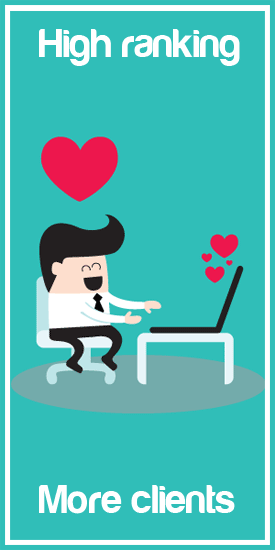St Louis Search Engine Optimization
St Louis SEO and Search Engine Optimization Services
St Louis search engine optimization. Local SEO and website optimization is important. Showing up above your local competition in search results can be the difference in expanding, or giving away free traffic and conversions to your competitors. You must have searched something related to St Louis Search Engine Optimization, or St Louis SEO. Now that we have your attention, let's talk a bit about SEO, and how our internet marketing services will earn your business more money from your website. The following content was designed around helping you to better understand how a search engine works, how data is analyzed from your website, and how we can help you obtain a higher rank than your competition. For a free consultation on how we can help optimize your St Louis website contact us here.
Local Search Engine Optimization Isn't Magic

Search engine optimization affects all aspects of your website, and takes many forms. Most people think there is some "magic formula" that will make their website sail to the top of Google and Bing rankings, but unfortunately that is not the case. The truth is much less exciting (or if you are like us, much more exciting) than the idea of magic.
Our St Louis optimization experts look at all aspects of your SEO campaign. What is SEO? Search engine optimization or "SEO" is the careful analyzation of on-page content, relevant backlinking and online documents, business listing optimization, off-page SEO (page titles, meta and descriptions), page load time, and making the search engine able to clearly see what your site or business offers--emphasis on clearly. If Google or Bing has to work too hard to sift through a bunch of irrelevant content to find out who you are, what you do, and where you do it, chances are that another competitor will be ranking ahead of you, particularly if their website is broadcasting its message clearer to the SERP providers. So far, so good? Ok, let's move on and see how wikipedia defines SEO.
SEO As Defined By Wikipedia
"Search engine optimization (SEO) is the process of affecting the visibility of a website or a web page in a search engine's "natural" or un-paid ("organic") search results. In general, the earlier (or higher ranked on the search results page), and more frequently a site appears in the search results list, the more visitors it will receive from the search engine's users."
Structured Page Content and On Page SEO

So you are a small or medium-sized St Louis business owner, and you want to share your story with the world? Great! You should be proud of who you are, and the history behind your local business. Writing your story and the service or products that you offer should always be a part of communicating your business online to potential consumers or clients.
Simply put, when a person reads your website, they should be able to clearly see all the services and products that you offer, and Google and Bing are no different. As stated earlier, if a search engine has to search through a lot of "story" and very little structured content that is optimized for the web, the message gets muddled. Here is an example; If people are searching for your name "Tom's Red Widgets", and you sell red widgets, and you come up, great! But, that's not most people search online for products or services, as they will be unaware that your business even exists.
Online, (and locally in St Louis) people search in a way that is more "natural". A more natural or organic search query would be one that includes the person's location, and what they are looking for, such as "red widget seller in St Louis". This is a more natural way of speaking, and searching for information. Along with that, if your content is properly optimized around your service and location, Google will be able to clearly identify that you are a red widget seller, and that you offer your products in St Louis, MO. Get where we are going with this? Awesome! Read on.
Relevant Backlinking

Let's relate. There is a keyword (pun intended) in the title above that you should focus on: relevant. If your backlinks are not relevant to your source and include various related forms of anchor text, then the search engine will get confused. Keep in mind, the Google bot is not intelligent. It is a complicated computer script that was programmed by humans to see how relevant a site and all the aspects and mentions of that site across the web are. If you meet the desired score of the algorithm that processes backlinks, you win, meaning you rank higher.
Follow me. We have talked to a lot of clients that are surprised that their paid backlinks don't get the desired result, only to find out that the link is not followed (meaning that the page rank is not passed through to your site) or that the anchor text or site is not related to the subject of your site. This would be like having an auto body repair site linking to a site about jewelry sales. It doesn't make sense and it simply doesn't work. Having backlinks that are from local directories or matched to your industry is the only way to ensure a successful backlinking campaign.
Off-Page SEO

Ahh, the good stuff...that most people never even see. Off-Page seo can be described as the back-end information that is served up to search engines to tell them what a site is about in as few words or characters as possible. This consists of page titles, meta descriptions, and meta keywords. This is served up differently by HTML code, or by databases used in a CMS (content management system). Some CMS work against this by presenting the back end SEO to the Google (or Bing, or whatever search engine is being used) bot later in the code, causing a delay in processing the information.
It's wise to use a CMS that renders your back end optimization quickly, and cleanly. Wordpress and Joomla are two very popular CMS choices, used by millions of people.
Choosing your back end keywords choices for your off-page seo can be a difficult task, as you are often given character limits, which limits the ability to "keyword stuff". Keyword stuffing is using a lot of variations of the same thing on a webpage, to try and rank higher for a keyword of your choice.
Google's Panda update targets keyword stuffing as part of poor quality content, and will generally penalize sites with a lower rank for doing this. Having your off-page content fall within the character count, while still being completely relevant to what is on your page and not repeating yourself is key. Google offers this free tool to help you when selecting your keyword choices.
Consistent Information

If we went around the entire internet, searching for info on a particular company, what would you find? In a perfect world, you would find consistency. Consistency is a large part of your SEO strategy, as it allows a search engine to validate who you are, and what you do. Let's break it down shall we?
For this example, we are going to use Bob as an example. Bob owns an appliance repair company, and has a website that is well optimized to his knowledge. Bob also went out and set up all his business listings himself. He has the standard Google, Bing, and Yahoo listings, along with a few other citation site listings such as Merchant Circle and Yelp. Bob has information on his site about all his services. When looking at his listings, we discover that he often listed in the wrong categories, lists different service areas, and has incorrect information listed for his company across the internet. On his website, he also does not link out to many of the citation sites he is a member of, and waits for Google to find them on their own time. Wrong Bob. Very wrong.
Character is like a tree and reputation like a shadow. The shadow is what we think of it; the tree is the real thing. - Abraham Lincoln
One way to look at search engine optimization is to make it as easy as possible for someone to find information about your business, search engine bots included. When the bot (or crawler as some people refer to it) crawls the web in search of validation for your company, the info should match the message you are displaying on your site. Addresses, services, phone numbers, links, and descriptions should all tell the same story. If you have 30 places all saying that Bob does appliance repair in his service area, chances are, he probably does, and the search engines know it. How do they know it? Because the internet tells them so. Search engines know the difference between what real people and spam bots do by studying the behaviors and relevancy of the information available. So now Bob hires Web Design and Company, we correct all his information out on the web, fix all the inconsistencies, submit Bob's company to all the relevant directories and under the correct categories and make the search engines happy. Bob now ranks higher, because his information is consistent, and giving the search engines a much clearer picture of who he is, what he does, and where he does it. Good job Bob, well done.
Page Load Time

A simple and one of the most overlooked factors in SEO is the speed at which the page is loaded to the user, meaning the viewer of the webpage. Google has programming in its algorithm that can grade the load speed of your site, and how fast it renders information to the user. Part of Google Webmaster Guidelines is "providing the end user with a pleasant, informative, user-friendly experience." Think of a slow loading website like waiting in a slow moving line. It sucks, and nobody likes it. Even if your site is pretty to look at and has a lot of good content, if people have to wait to see or read it, they won't.
Location, Location, Location!
Another factor that boils into page load time, is where your servers are located. Think about this, if you host a site that services the area of Austin, Texas, why would you want your server that hosts your site to be in Montana, New York, or somewhere far away? Knowing where your servers for hosting are located is a small, but simple way at eliminating the small things that add up into the bigger picture. If you were to have your servers in Austin, the area where your company is located, Google could detect the servers location, and ping times would be lower since the information is so close at hand.
If you enjoyed reading this article, please Follow us on Google+. This is just a small glimpse into the world of SEO, and getting your website ranking higher in search engine results. If you would like to know more, please contact Web Design and Company, for a free seo consultation.
You more than likely reached this page by searching for St Louis search engine optimization. If you would like to read more about SEO and content marketing, please visit the related topics and resources below:
<< Back to St Louis SEO services page

